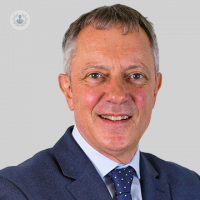Am I too old to get pregnant?
Escrito por:If you're over the age of 40 and looking to have a baby, there are lots of things you can do to increase your chances of success. We asked leading obstetrician Mr Michael Booker for his top tips, as well as an overview of what kind of medical help is available if you're struggling to conceive on your own.

What are the chances of getting pregnant over 40?
Many couples where the woman is aged over 40 will achieve a pregnancy naturally within 6-12 months of trying.
For a healthy fertile couple in this age group, the chance of getting pregnant in any ovulatory cycle is between 10 and 30%. This means that if a pregnancy has not happened after a year of trying, it’s time to seek medical advice.
Natural fertility declines with increasing age, and many women will experience a decline in their fertility from their late 30s onwards. Coupled with this is an increased rate for miscarriage, and an increased risk of having a child with Down syndrome. As a result it’s now routine for all women to be offered screening in early pregnancy.
What can I do to increase my chances?
It’s really important in order to optimise the chances for pregnancy, that both the man and the woman do their best to lead a healthy lifestyle. This includes:
- maintaining a normal body mass index , and to avoid becoming overweight. For anyone who is obese (BMI > 30), it’s recommended to reduce weight down to a BMI of no more than 30.
- giving attention to diet and exercise, and general well-being. For some couples, this will mean making major changes to their lifestyle.
- reducing your alcohol intake to no more than moderate consumption
- stopping smoking , as this damages and reduces both male and female fertility.
For any underlying medical conditions, treatment needs to be optimised. For example, thyroid disease and diabetes need to be controlled as well as possible.
For the woman, this includes treating any gynaecological conditions such as fibroids and endometriosis.
How can fertility clinic help?
For any couple in this age group who are concerned about their inability to conceive, I would recommend arranging some initial investigations with your GP. This will include an assessment of ovarian reserve, which naturally will be lower in the over 40s.
If there are any concerns, and if a pregnancy is still not established, onward referral to a specialist fertility clinic is recommended. This might be within the NHS, or in the private sector. Initial investigations may reveal a treatable cause for infertility, and if that is the case, I would recommend following the advice you receive.
However, many couples will need to move on to fertility treatment. Availability of NHS funded treatment is limited, which means that many couples will seek help from private fertility clinics. In the UK, all clinics offering fertility treatment are regulated by the Human Fertilisation and Embryology Authority.
The choice of treatment is typically between:
- ovarian stimulation combined with intrauterine insemination (IUI)
- in vitro fertilisation (IVF).
In this age group, IVF will give a higher chance of success, which means that most clinics will recommend IVF treatment.
How successful is IVF treatment?
Success rates for IVF treatment will vary for a number of reasons, including the woman’s ovarian reserve. However, if treatment goes well resulting in the transfer of a healthy embryo, or embryos, success rates around 15% can be expected. This means that even if treatment does go well, there is no guarantee of success.
How can I increase my chances of success with IVF?
There are several ways to increase your overall chances.
One option is to have multiple rounds of treatment. Sometimes there are embryos of good quality surplus to requirements, in which case these can be frozen for subsequent frozen embryo transfer treatment cycles.
Some couples will want to take the IVF process stage further, and to have the embryos biopsied prior to embryo transfer. This process is called pre-implantation genetic screening (PGS), and ensures that only embryos with the correct number of chromosomes will be transferred. This increases the chance for a pregnancy and greatly reduces the chance for miscarriage.
In this age group IVF with PGS will carry a success rate of up to 85%, but only 38% of women will have a chromosomally normal embryo to transfer.
Going through fertility treatment is always stressful, and it is important to have a support network of family and friends if you can. In addition, all clinics will offer specialist fertility counselling. Finally, there are also a number of organisations which are able to help couples going through treatment, such as the Fertility Network.



